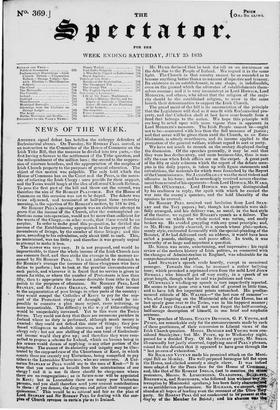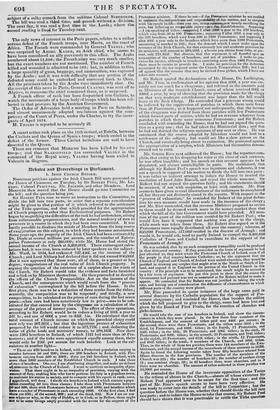NEWS OF THE WEEK.
Sir ROBERT PEEL'S opening speech was an elaborate attempt to prove that the income of the Church, after the contemplated re- ductions came into operation, would not be more than sufficient for the wants of the Clergy,—in other words, that there would be no surplus. In order to make good this proposition, he divided the income of the Establishment, appropriated to the support of the incumbents of livings, by the number of those livings; and this gave, according to his calculation, only about 2001. to each. This, he maintained, was too little; and therefore it was grossly unjust to attempt to make it less.
The answer was very easy. It is not proposed, and would be impracticable, to throw the whole income of the Irish Church into one common fund, and then strike the average in the manner as- sumed by Sir ROBERT PEEL. It is not intended to diminish to Sir ROBERT's average the incomes of those clergymen who have duties to perform ; but to look at the peculiar circumstances of each parish, and wherever it is found that no service is given in return for tithe, or where the number of Protestants is less than fifty, then to appropriate the income derivable from tithe in that parish to the purposes of education. Sir ROBERT PEEL, Lord STANLEY, and Sir JAMES GRAHAM, would apply that income to the augmentation of poor livings in other parts of the country : they would compel the Catholics of Kerry to pay for the sup- port of the Protestant clergy of Armagh. It would be im- possible to conceive a plan more unjust, more irritating, or more impracticable. The difficulty in the eel of tithe-collecting would be unspeakably increased. Yet to this were the Tories driven. They could not deny that there are numerous parishes in Ireland where no duty is performed, although much money is exacted : they could not defend this state of things • they pro- fessed willingness to abolish sinecures, and pay the working clergy only : but not one shilling of the sum total of Ecclesiasti- cal income would they give up; and therefore they were com- pelled to propose a scheme for Ireland, which no human being in his senses would dream of applying to any other portion of the kingdom. The extent of its absurdity and iniquity may be illus- irate! by the supposed case of the Churchmen of Kent, in which :cotuity there are scarcely any Unitarians, being compelled to pay tithes to the Lancashire Unitarians, who are numerous. A Uni- larian STANLEY or PEEL would say to the men of Kent—" It is true that you receive no benefit from the ministrations of our clergy ! and it is not fit there should be clergymen where there are no congregations ; so in future none will be appointed in Kent; but in Lancashire there are many poor Unitarian parsons, and you shall therefore send your annua4 contributions to them : if you demur, the dragoons and police shall compel ac- quiescence." This would be as rational and fair as the plan of Lord STANLEY and Sir ROBERT NV. for dealing with the sur- plus of Church revenue in certa:0 plat es. iu Ireland,
Mr. Hume declared that he took the bill as an instalment on the debt due to the People of Ireland. We regard it in the same light. The Church in that country cannot he so amended as to become anything better than a monument of injustice and tyranny. Its existence as an establishment. in any shape, is indefensible, even on the ground which the advocates of establishments them- selves assume; and it is very inconsistent in Lord Howice, Lord
MORPETH, and others, who admit that the religion of the majo- rity should be the established religion, to avow in the same breath their determination to support the Irish Church.
The grand merit of the bill is its annunciation of the principle
that the Legislature will deal as it sees fit with Ecclesiastical pro- perty, and that Catholics shall at last have some benefit from a fund that belongs to the nation. We hope this principle will ere long be acted upon with more vigour than is apparent in Lord MORPETH's measure. The Irish People cannot be—ought not to be—contented with less than the full measure of justice ; and that never will be given them until the Church, as an Esta- blishment, is utterly overthrown, and its income applied to the promotion of the general welfare, without reward to sect or party.
We have not much to remark on the oratory displayed during
the discussion. Of the speeches generally, it may be said that they were less declamatory, and more business-like, than is usu- ally the case when Irish affairs are on the carpet. A great part of the fifty or sixty columns which the report of the debate occu- pies in the daily papers, is taken up with figure statements and calculations, the materials for which were furnished by the Report of the Commissioners. Sir J AMES GRAM AM was the most violent and offensive in his tone; and he accordingly received severe chastise- ment from several of his opponents—froth Lord Howie it,Mr.W Aim, and Mr. O'Co:cleer.. Lord HOWICK was again distinguished by his readiness in reply, the spirit with which he carried the war into the enemy's quarters, and the bold liberality of the
opinions lie avowed. .,
Sir ROBERT PEEL received vast laudation from Lord STAN- LEY and the Tory papers ; but, though his materials were skil- fully arranged, and his delivery was, as usual, is the best style of the theatre, we regard Sir ROBERT'S speech as a failure. The foundation on which the whole rested was rotten, and easily broken up. He avoided grappling with any great principle; and, as Mr. Hume justly observed, in a speech whose plaia-spoken, manly style, contrasted favourably with the special-pleading of the Baronet, if he had delivered such an address, it would have been called a pounds, shillings, and pence affair. In truth, it was unworthy of so large and important a question. Mr. SHELL was acute, entertaining, and impressive : his rapid review of the modern history of Irish politics, as connected with the changes of Administration in England, was admirable for its comprehensiveness and point. Lord STANLEY'S speech reads heavily, except in occasional passages. Towards the close, he assumed a rather bullying tone; which provoked a reprimand even from the mild Lord JoHN RUSSELL; who himself got off very easily, in a speech of no great length, though what he said was judicious and true. O'CONNELL'S winding-up speech is very imperfectly reported. He seems to have gone over a vast deal of ground in little time, and to have left few important points untouched. His goodhu- moured ridicule of Mr. WALTER—" the last rose of summer"— who, after lingering on the Ministerial side of the House, has at last openly gone over to the Tories, was in his happiest manner; and Sir JAMES GRAHAM will not soon forget the half-sneering, half-savage description of himself, in one brief and emphatic sentence.
The speeches of Messrs. EVELYN DENISON, G. F. YOUNG, and PUSEY, are remarkable only for the announcements made by each of these gentlemen, of their conversion to Liberal views of the Irish Church question. Messrs. DENISON and YOUNG were con- sidered Stanleyites ; but Mr. PUSEY. up to Wednesday night, passed for a decided Tory. Of the STANLEY party, Mr. SHELL ill-naturedly but justly observed, (applying one of PEEL'S phrases, coined for the debate) that it appeared to have gone through the
" last process of exhaustion." .
Sir RICHARD VYVYAN made his promised attack on the Muni.
cipal Bill on Monday. hiswell-prepared harangue fell flat upon the House, and elicited scarcely a single cheer. It was indeed
more adapted for the Peers than for the House of Commons; I and, like that of Sir ROBERT luaus, (not to mention, the minor *e.„,\ 1 protesters, Messrs. S. LUSHINGTON, GLADSTONE, -SCARLET'',./( '1 BORTHWICK, and SIBTHORPE, who followed him without any ,in. .0 f terruption by Ministerial speakers,) has been fairly characterized ito 4' ' a as an antidiluvian performance. Sir RICHARD, we .k'nspect, Meat; , abandon all hopes of leading even the remnant ofthe Ultra Tory. . . 1 party. Sir ROBERT PEEL did not condescend to 10-present at the ?..: disp'ay of the Member for Bristol; and bin absence WAS c49pi,;,... subject of a sulky remark from the sublime Colonel SIBTRORPE. The bill was read a third time, and passed, without a division: The next day, it was read a first time in the. Lords ; where the: second reading is fixe.sl. for Tuesday. next.



























